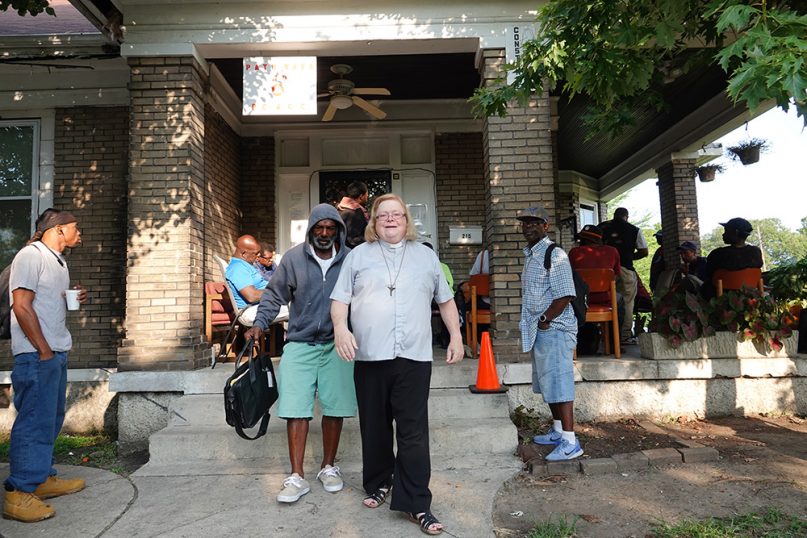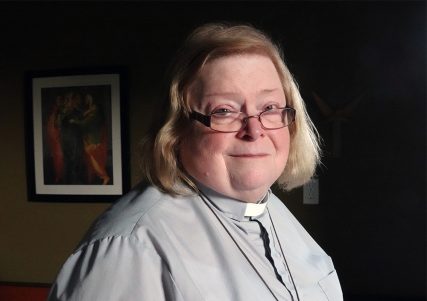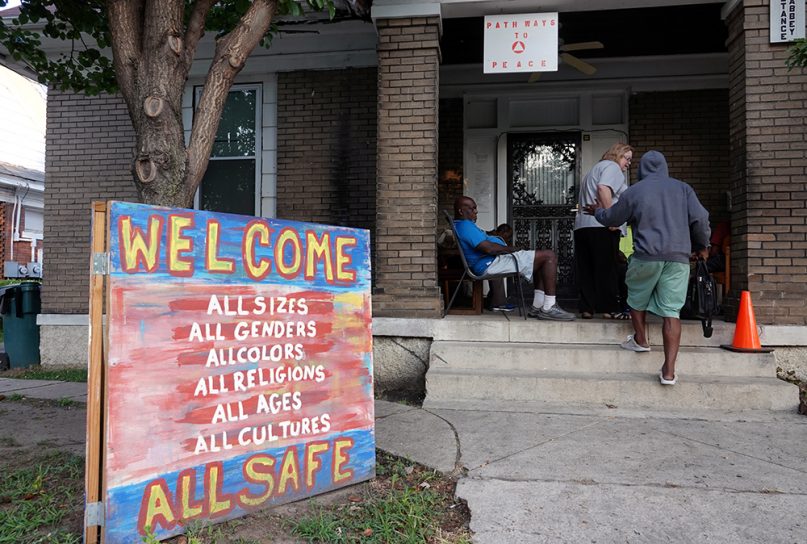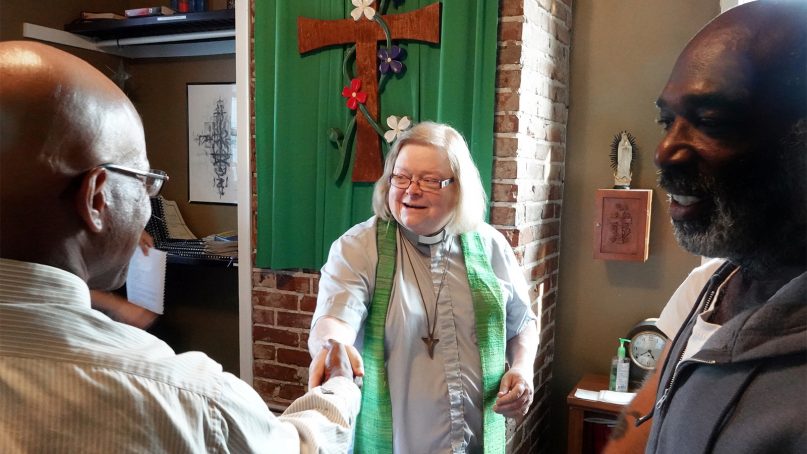MEMPHIS, Tenn. (RNS) — In the makeshift chapel at Constance Abbey, an Episcopal way station for the homeless here, Mother Gillian Klee celebrated the Eucharist one morning for a small group of guests and staff.
Klee’s hands trembled as she blessed the bread and wine, an unaccustomed nervousness for an Episcopal priest who has performed the ritual hundreds of times in parishes across the mid-South.
But Klee has only rarely celebrated Mass since retiring abruptly in 2010 from St. Stephens Church in Blytheville, Ark., rather than tell the congregation she had begun sex-hormone therapy to transition from bearded George Klee into Gillian, George’s long-held alter ego.
Since then, she had been on a “supply” list of priests available to fill in for priests on leave or vacation. But in the conservative Diocese of West Tennessee, the phone never rang.
“It’s not the bishop that keeps me from celebrating,” Klee said. “It’s just that no one called me up, not in a long time.”
Then, in 2017, Klee ran into Roger and Margery Wolcott at an LGBT conference at an Episcopal camp in Mississippi and was invited to serve as chaplain at Constance Abbey, the New Monastic community the Wolcotts had founded in two century-old brick houses near St. Mary’s Episcopal Cathedral.
“It feels wonderful to have an altar again,” Klee said. “It’s wonderful to have a place again. I am getting to know those folks, and getting to like them.”
Besides serving Communion and leading prayer services on Monday and Thursday mornings, Klee leads a roughly 30-minute course on human sexuality for the abbey’s guests, after a scuffle between straight and transgender people broke out recently on the grounds.
“I feel sort of a mother-of-the-bride proud,” said Roger, a retired investment banker who relocated with Margery to Memphis from San Francisco. “First of all, Gillian is a friend, so I am happy she can be our chaplain. I’m happy that a transgender priest can be welcome in this city, in this place.”
As someone who has lived for the past eight years as an outsider, Klee is, Roger pointed out, a fitting spiritual leader for those the Wolcotts hope to serve in the gritty neighborhood behind the cathedral. The abbey is named after a nun who stayed in Memphis during the 1878 yellow fever epidemic to nurse the poor.

Mother Gillian Klee is now the chaplain at Constance Abbey, a refuge for the homeless in Memphis. Until last year, Klee rarely celebrated Mass since retiring in 2010. RNS photo by Karen Pulfer Focht
Klee wears sensible shoes and shades of peach lipstick and red fingernail polish. Her blond hair frames her face and flips gently under. She’s one of those women who’s had her colors done and seemingly has a closet full of the right ones.
Because she began taking female hormones late in life, she will always have the voice and build of a man.
“The older you are, the slower the therapy works, which is a sad thing,” said Martha Klee, Gillian’s longtime wife.
Gillian and Martha live, as they have since they married in 1991, in an apartment in East Memphis. They make quarterly trips to St. Louis to see the endocrinologist and psychologist who facilitated this far-reaching change in their lives. Instead of husband and wife, they live now as two women, sometimes feeling the need to let new acquaintances know they are not lesbians.
“I expect to be with Martha for the rest of my life,” Klee said, though she admitted to dreaming occasionally she could be a man’s wife.
“That’s never going to happen. But, we all have dreams that aren’t going to happen,” she said.
Klee was raised Baptist in Memphis and winces as she talks about the pressure as a child to “act tough like a boy.” She always felt she didn’t fit in. As early as age 13, she considered suicide.
Klee graduated from Southern Baptist Theological Seminary in Louisville, Ky., in 1972, prepared to serve as a Baptist minister, but in the mid-1970s she left her childhood church. “I was liberal and war had been declared by the Southern Baptist Convention against liberal church and liberal clergy,” she said.
She worked for a few years with a consortium of churches around the University of Memphis that included St. John’s Episcopal, and Klee began attending.
She found an openness she hadn’t seen in the Baptist church. “I felt more accepted in the Episcopal Church. Having been a theater major and taking music appreciation, it all fit — the pageantry, the music,” she said.

Mother Gillian Klee retired in 2010 from St. Stephens Church in Blytheville, Ark., as she began her transition from being a male, George Klee, into a female, Gillian. She is now the chaplain at Constance Abbey, a refuge for the homeless in Memphis. RNS photo by Karen Pulfer Focht
Klee was ordained an Episcopal priest in 1984 and for the next 20 years served Episcopal parishes across Tennessee.
When, in 2006, Klee was chosen to serve St. Stephens in Blytheville, it was a dream come true. The congregation was small, but the community was a “real cultural surprise.”
“They had an active theater company, a community chorus that did great programs,” Klee said. “I taught world religions at the junior college, and I was also part of the theater group.”
But all was not right. For most of her years in ministry, Klee often suffered a debilitating depression, which would intensify during Lent, the six weeks before Easter when Christians examine how they have fallen short or need to change.
At St. Stephens, the depression eased to the point that it cropped up only in Lent. But Klee remembers having to will herself out of bed. In the last years before her transition, she could barely attend to the suffering of others during Lent.
“I could have been a more effective priest as my whole self,” she said.
By 2010, her life was a widening pool of anxiety. Martha, worried that the pain was too much, suggested that Klee resign.
The decision to start hormone therapy “was an act of courage,” said Klee, but “I have very little choice. The alternative was to continue with the depression.”
Being married to Gillian, not George, was also a profound change for Martha, and one she was not prepared for. Her introduction to her new life had come when Klee, leaving for a church convention, tossed a book on transgender transformations at her.
“She said, ‘We’ll talk about this when I get back,’’’ said Martha. “I was furious.”
For the next two years Klee saw her doctors frequently. When the hormone therapy began, Martha said, “The doctor tried her best to make sure that I knew what was going on and that there was not any inadvertent damage.
“I knew the relationship was going to have to fall apart and be put back together.”

Mother Gillian Klee enters Constance Abbey, a refuge for the homeless in Memphis. RNS photo by Karen Pulfer Focht
Klee also had to face the church. Upon returning to Memphis, Klee went to visit Don Johnson, the bishop of West Tennessee, hoping to find a place to serve. As it happened, the bishop’s wife was selling makeup. Johnson had her help Klee.
“He paid for it,” Klee said. “I was surprised. It was such a gesture from the bishop. Since then, he has said he is proud I live in his diocese because we have a reputation for being conservative.”
“Gillian is a committed priest of the church, a fine Celtic scholar and a person of courage for squarely facing into what it means to live out her transgender identity,” said Johnson, who has known Klee for more than two decades.
“I do not claim to understand the full implications of the intricacies of this courageous act of personal discernment,” he said. But “I pray that opportunities for her to use her gifts for ministry will open for her as God leads the way.”
For now, Klee has found a place in the only church in the diocese that has neither steeple nor membership, and therefore little chance to offend.
“As a transgender woman, I’m misunderstood by the largest part of society,” she said, “and the people who we minister to are misunderstood because people think it’s their fault they are on the street.”





